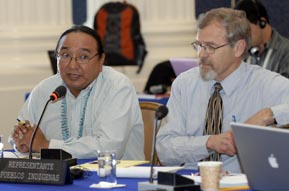WASHINGTON, D.C. - The development of an American Declaration on the Rights of Indigenous Peoples by the Organization of American States (OAS) has been underway for more than 20 years. In recent months, the OAS draft American Declaration process has slowed significantly. Some of the delay is due to differences in opinion regarding how to proceed following the adoption of the United Nations Declaration on the Rights of Indigenous Peoples.
 |
| Navajo Nation Council Delegate Rex Lee Jim, and Native American Rights Fund attorney Kim Gottschalk at the OAS. Photo by Juan Manuel Herrera. |
The United States and Canada have stated a refusal to approve a strong declaration at this time, reflecting the same position they took in refusing to vote in favor the UN Declaration on the Rights of Indigenous Peoples last September.
There have been only two meetings in the past seven months involving countries and indigenous representatives, neither of which yielded much progress on either the text of the American Declaration or the larger issues that are being debated in the process.
The first of these meetings was a Reflection Session convened in November 2007 to consider the objectives and methodology of the negotiation process, and to come up with suggestions for how to improve it. While states and indigenous representatives submitted recommendations to the Permanent Council on these matters, it seems that those recommendations will not be acted on until after the next General Assembly meeting in June 2008.
The second meeting was the Eleventh Negotiation Session on the draft American Declaration, held in April 2008. Disagreements arose regarding how to continue the negotiation process, with Canada and the United States being the most vocal objectors to using the UN Declaration as a point of reference.
The Center's representatives and attorneys have encouraged greater participation by Indian nations and indigenous governments in order to give greater weight to the political and practical need for an American Declaration. We will continue to inform and involve these nations, monitor developments, provide legal assistance, and meet with all the actors in our efforts to make progress.
We recognize that the UN Declaration on the Rights of Indigenous Peoples already speaks to indigenous peoples' human rights as individuals and collectives in a global context. However, the Americas have a very different history from other parts of the world, and indigenous peoples in the Americas continue to experience the legacy of colonialism. Indigenous peoples in the Americas continue to suffer grave economic, social, political, and cultural deprivation. It is critical for the Organization of American States to specifically address the rights of indigenous peoples in the Americas, rather than to rely solely on the UN Declaration on the Rights of Indigenous Peoples.
